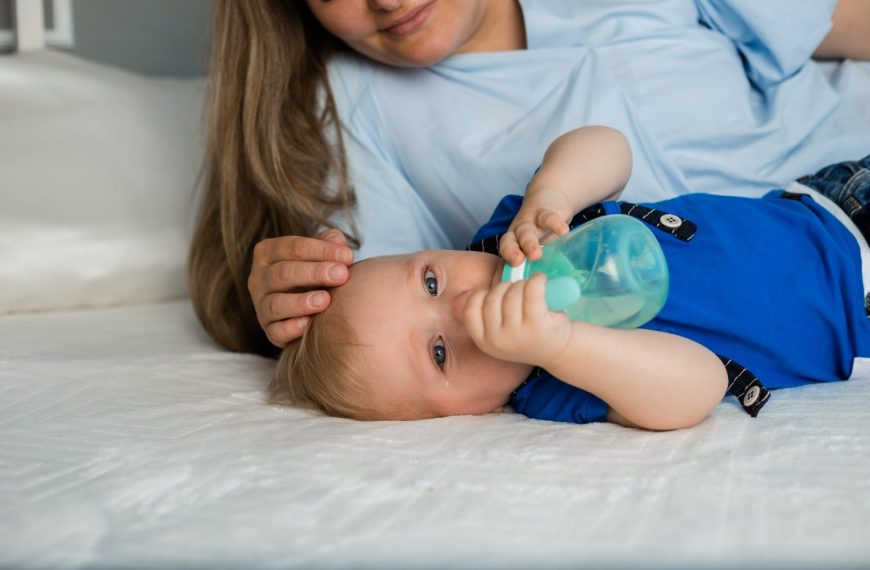Once our baby enters our lives, it seems like everything we do revolves around them. Their happiness, health, and growth become our top priorities. And babies, tiny as they may be, come with a lot of cute and some ‘not-so-cute’ baggage – especially the health related ones like colic in babies, gas, and fussiness. This is a major concern for most young parents.
For ages, many parents have turned to gripe water as a potential remedy. Gripe water for kids has been used as a popular folk remedy to soothe digestive discomfort. However, it comes with its share of cons. In this article, we will explore the important question in most parents’ minds ‘is gripe water safe for babies’. We will also understand its applications, possible side effects, and alternative solutions, including home remedies.
Understanding Gripe Water for Babies
Before we go deeper into the why’s and what’s of Gripe Water for babies, let’s understand what exactly it consists of. Gripe water uses natural ingredients to soothe common digestive discomforts in infants, such as colic and gas. It is a liquid made with a combination of herbs, like fennel, chamomile, ginger, and dill, baking soda (sodium bicarbonate) and a sweetener. While gripe water uses are primarily associated with infant care, some adults have found relief from indigestion by using a diluted version of this herbal remedy.
Is Gripe Water Safe For babies? 6 Potential Pitfalls of Gripe Water for Kids
Did you know about the potential gripe water side effects for babies?
When taken as recommended, gripe water is generally regarded as safe, but it’s vital to be aware of any possible adverse effects that can affect some infants. The following are some potential negative effects of gripe water for babies:
- Upset Stomach
- Intolerance to Sweeteners
- Interference with Medications
- Disruption of Gut Flora
- Sodium Bicarbonate-related Issues
- Contamination Risks
Upset stomach is one of the major gripe water side effects for babies. Gripe water contains herbs and other substances that can affect the delicate balance of a baby’s digestive system. It might occasionally give someone a stomach ache, which could result in vomiting, diarrhoea, or loose stools. If your baby experiences persistent gastrointestinal distress after consuming gripe water, discontinue its use and consult a healthcare professional.
Gripe water often contains sweeteners, such as sucrose or fructose, to mask the taste and make it more palatable. However, some babies may have an intolerance to these sweeteners, leading to digestive issues, excessive gas, or bloating.
Gripe water can potentially interact with certain medications that your baby may be taking. To prevent any potential interactions or adverse reactions, it is essential to let your pediatrician know about any medications, including over-the-counter medications, that your infant is taking. Therefore, please read the ingredients and evaluate if the gripe water ingredients are suitable for your baby.
The herbal gripe water ingredients can disrupt the natural balance of bacteria in a baby’s gut. This imbalance may lead to gastrointestinal problems, such as constipation or increased susceptibility to infections. If you notice any changes in your baby’s bowel movements or overall health after using gripe water, consult with a healthcare professional.
Gripe water often contains sodium bicarbonate (baking soda), which can interfere with the normal pH levels in a baby’s stomach. This can lead to excessive gas, acid reflux, or electrolyte imbalances. Sodium bicarbonate should be used cautiously and under the guidance of a paediatrician.
Inadequate manufacturing practices or improper storage of gripe water can increase the risk of contamination. It is essential to choose a reliable brand that follows strict quality control measures and ensures that the product is not expired or tampered with.
It is worth noting that while side effects of gripe water are possible, they are relatively rare. Many babies tolerate gripe water well and experience temporary relief from digestive discomfort. However, it is crucial to closely monitor your baby’s response to gripe water and discontinue its use if any adverse effects are observed.
3 Reasons Why Gripe Water Is Generally Given
When used appropriately and under the guidance of a healthcare professional, gripe water may provide temporary relief for certain common digestive issues in babies. Gripe water for infants is generally given to provide comfort from stomach upsets. Here are some applications where gripe water might be used:
- Colic :
- Gas and Digestive Discomfort:
- Teething Discomfort:
Gripe water is commonly used to alleviate colic symptoms, such as excessive crying, fussiness, and difficulty sleeping. Here, do make a note that colic is very common in the first few months. It will resolve on its own mostly.
“Research suggests up to 28 percent of infants worldwide experience colic in the first few months of life. It’s more common in infants under 6 weeks, and it becomes less common as the child turns 10 to 12 weeks.”
Valencia Higuera, Kimberly Holland and Meredith Wallis
Gripe water may offer temporary relief from gas, bloating, and indigestion in infants. The herbal ingredients in gripe water are believed to have calming and soothing properties for the digestive system.
Some parents use gripe water to help ease the discomfort associated with teething. However, first check with your if that is not happening because of some other underlying factor like an infection etc.
5 Alternative Solutions and Home Remedies
If you’re hesitant to use gripe water or want to explore alternative options, there are several safe and natural remedies you can try:
- Feeding Adjustments:
- Tummy Time:
- Massage:
- Warm Compress:
- Probiotics:
Ensure that you are using the proper feeding techniques, such as proper burping after each feeding and holding the baby in an upright position during feeding. Sometimes, excessive air ingestion during feeding can contribute to digestive discomfort.
Engage your baby in regular tummy time activities to help strengthen the abdominal muscles and promote digestion. This can also aid in the release of trapped gas.
Gently massaging your baby’s abdomen in a clockwise motion can help alleviate gas and promote digestion. Use light pressure and circular motions around the belly button.
Applying a warm compress or a warm water bottle wrapped in a towel to your baby’s tummy can provide relief from colic and gas.
Consuming probiotic-rich foods like yoghurt or taking probiotic supplements may aid your baby’s digestive system’s gut bacteria balance. Consult with a paediatrician before introducing probiotics.
Choose Safely, Consult Wisely when you plan on giving gripe water for infants!
Conclusion
When it comes to the safety and efficacy of gripe water for infants, it is crucial to exercise caution and consult with a healthcare professional. While gripe water may provide temporary relief for common digestive issues, it is essential to be aware of potential side effects and choose a reputable brand. Alternative solutions and home remedies can also be explored as safe options for addressing colic, gas, and fussiness in infants.
For informative and accurate articles on all things related to your new born-toddler’s development, growth, health and nutrition, follow EuroKids Blogs and do check out our nationally recognized preschools – EuroKids for the first step in your kid’s educational journey!

















